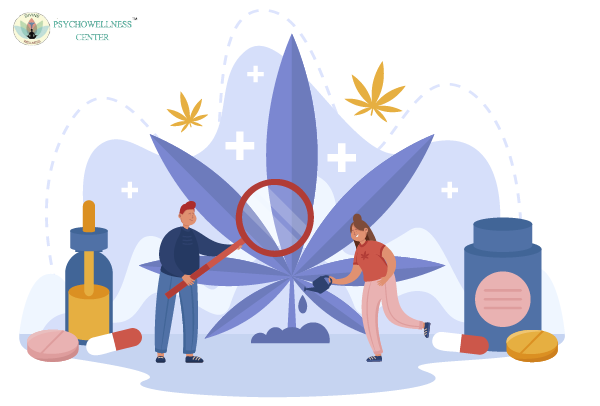Cannabis, widely used for recreational and medicinal purposes, has sparked significant debate regarding its potential effects on mental health. While many people use cannabis without experiencing negative consequences, growing concerns exist about its association with psychosis—a condition that involves a loss of contact with reality. This connection has become particularly significant as cannabis use increases globally, especially in areas where it has been legalized. Understanding the link between cannabis and psychosis requires a nuanced look at how cannabis affects the brain and the risk factors that might influence the development of psychotic disorders.
What Is Psychosis?
Psychosis refers to a mental state in which an individual experiences distorted thinking, perception, and emotions, leading to a disconnection from reality. It is characterized by symptoms such as hallucinations (perceptions of things that aren’t there), delusions (false beliefs), and disorganized thoughts. Conditions like schizophrenia, schizoaffective disorder, and bipolar disorder can manifest with psychotic episodes. Psychosis can arise from various factors, including genetics, trauma, substance use, and certain medical conditions.
How Cannabis Affects the Brain
Young people, particularly adolescents and young adults, are more susceptible due to the ongoing development of their brains. These receptors are involved in regulating several mental processes, including cognition, memory, and emotional responses.
While THC is the compound most associated with the intoxicating effects of cannabis, CBD does not have the same psychoactive properties and may counteract some of THC’s effects. As such, much of the research linking cannabis to psychosis has focused on the role of THC, as it can potentially cause temporary alterations in perception, sometimes leading to symptoms akin to psychosis.
The Connection Between Cannabis and Psychosis
Numerous studies have highlighted an association between cannabis use, particularly heavy or frequent use, and an increased risk of developing psychosis. However, this relationship is not entirely straightforward. Cannabis does not directly cause psychosis in every user. Instead, it may act as a trigger or contributing factor for individuals who are already genetically or environmentally predisposed to psychotic disorders.
Genetic Predisposition
Genetics plays a significant role in determining an individual’s risk of developing psychosis. People with a family history of mental health disorders, such as schizophrenia, may be more vulnerable to the effects of cannabis. Research has shown that cannabis use in individuals with a genetic predisposition to psychosis can elevate the risk of developing psychotic symptoms. THC may exacerbate underlying vulnerabilities in the brain’s dopamine system, a key component in psychotic disorders like schizophrenia.
Age of First Use
The age at which someone begins using cannabis appears to influence the likelihood of developing psychosis. Child &Adolescents and young adults are especially at risk because their brains are still in the process of development. Early cannabis use, especially during critical periods of brain development, can disrupt the formation of essential cognitive functions, such as decision-making and emotional regulation. This disruption may increase the risk of mental health problems, including psychosis, later in life.
Frequency and Potency of Use
The frequency of cannabis use also plays a critical role in the risk of developing psychosis. Studies have found that those who use cannabis frequently or in large quantities are more likely to experience negative mental health effects, including psychotic episodes. Additionally, the potency of cannabis has increased significantly in recent years, with modern strains containing much higher levels of THC. High-THC cannabis can be particularly problematic for individuals susceptible to mental health issues, as it may have stronger psychoactive effects that increase the risk of psychosis.
Cannabis-Induced Psychosis
Cannabis-induced psychosis refers to a temporary state of psychosis that can occur after using cannabis, typically in individuals who have consumed large quantities of highly potent cannabis. Symptoms can include delusions, paranoia, hallucinations, and confusion. While these symptoms usually subside after the effects of cannabis wear off, there is a risk that repeated episodes of cannabis-induced psychosis could lead to long-term mental health issues. For some, these temporary episodes may evolve into persistent psychotic symptoms, eventually leading to a diagnosis of schizophrenia or another psychotic disorder.
Is Cannabis the Sole Cause of Psychosis?
While cannabis use is strongly associated with an increased risk of psychosis, it is essential to recognize that psychosis is a multifactorial condition. This means that multiple factors contribute to its development, including genetic predisposition, environmental stressors, and pre-existing mental health conditions. Cannabis alone is unlikely to cause psychosis in individuals who do not have a vulnerability to such conditions. Instead, it acts as one of many factors that can trigger or worsen psychotic symptoms in predisposed individuals.
Conclusion
Cannabis use and psychosis are linked by factors like genetic vulnerability, age of first use, and mental health conditions. While cannabis doesn’t directly cause psychosis in everyone, it increases the risk for certain individuals, especially those with a family history of early use. For those affected, online counseling at Talktoangel, family therapy, or Cognitive Behavioral Therapy (CBT) can help manage symptoms. Seeking support from the best psychologists in India is also crucial for tailored care. As cannabis use becomes more common, understanding the risks, especially for vulnerable individuals, remains key to ensuring informed decisions and safe consumption.
Contribution:- Expert mental health care by Dr. R K Suri and Ms. Srishti Jain Counselling psychologist—guiding you toward emotional well-being and balance.
References
- Di Forti, M., Sallis, H., Allegri, F., et al. (2019). Cannabis use and the risk of psychosis in a genetically predisposed population. Lancet Psychiatry, 6(3), 245-254. https://doi.org/10.1016/S2215-0366(19)30037-4
- Marconi, A., Di Forti, M., Lewis, C. M., et al. (2016). Meta-analysis of the association between the level of cannabis use and risk of psychosis. Schizophrenia Bulletin, 42(4), 1005-1013. https://doi.org/10.1093/schbul/sbw006
- Gage, S. H., Hickman, M., & Zammit, S. (2016). Association between cannabis and psychosis: Epidemiological evidence. CNS Drugs, 30(2), 85-97. https://doi.org/10.1007/s40263-016-0339-4
- van Os, J., & Kapur, S. (2009). Schizophrenia. Lancet, 374(9690), 635-645. https://doi.org/10.1016/S0140-6736(09)60995-

